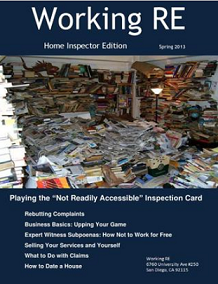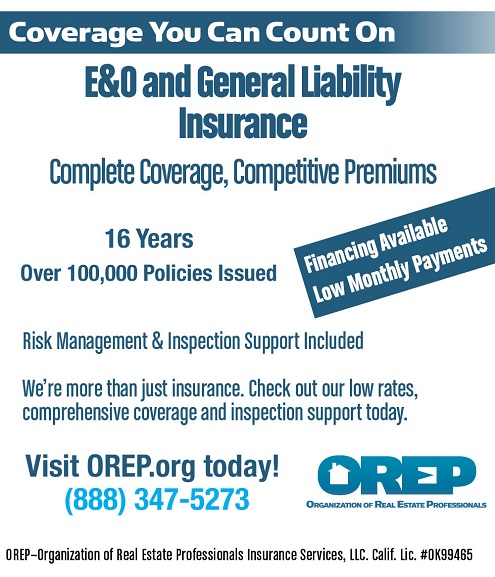
|
Home Inspectors Edition | Circulation 20,000 | Advertise | Subscribe | |
Published by OREP, E&O Insurance Experts | July 2013 |
 Click to Read Current Issue |
>
Click to Print
Note: If you live in a “higher-priced” state like
Calif., NJ, PA, FL or TX, OREP does not limit coverage or raise rates on you. Same rates apply in all states. |
Such knowledge is certainly useful to a potential home buyer, but the added liability involved in providing such an estimate causes many inspectors to avoid them. While some home inspectors believe a cost estimate is necessary, many argue that it may do more harm than good.
Should You Include Cost Estimates in Inspection Reports?
By Natalie Eisen, Staff Writer
Are home inspectors obligated to
detail expected costs of repairs in their reports? Inspectors line up
on both sides of the issue.
A home inspector’s job, first and foremost, is to help his or her
clients make an informed decision by thoroughly inspecting a home and
reporting the findings. In addition to reporting the condition of a
home and highlighting potential problem areas, should inspectors
discuss the cost to cure?
Such knowledge is certainly useful to a potential home buyer, but the
added liability involved in providing such an estimate causes many
inspectors to avoid them. While some home inspectors believe a cost
estimate is necessary, many argue that it may do more harm than good.
“I provide estimates for my clients,” says John Arnold, home
inspector, “but only when asked to do it. I make it clear that they
are ‘ballpark’ estimates and urge clients to obtain more accurate and
reliable estimates from appropriate contractors,” says Arnold.
Many inspectors are concerned about being able to provide an accurate
estimate – both for ethical and business reasons. For example, if a
home inspector estimates the cost of a new roof to be $3,000, when it
turns out to cost $6,000, the client may not be too happy.
On the other hand, if the estimate is too high, the buyer may
be scared away from the sale. For these reasons, many inspectors find
it safer to not include a cost estimate at all.
“No home inspector in my area provides cost estimates, at least that I
know of,” says Gunnar Alquist, California home inspector. He goes on
to explain that bidding on a job takes both time and knowledge of
costs that he
simply does not have. In this case, it would be better to call in an
expert. A tree-trimmer, for example, would be far more likely to know
the cost estimate of removing the magnolia in the front yard than a
home inspector. This process is likely safer for both parties, since
the expert is able to more accurately estimate costs for a buyer.
What if a client asks
specifically for a cost estimate? Home inspectors vary in their
responses, with some refuse outright and others gently inform their
client that such estimates are unlikely to be accurate. Other
inspectors have different strategies. “I only provide cost estimates
for clients who pay for this service and very few want to pay for this
service,” says Scott Patterson, a home inspector in Tennessee. “For
anyone who provides cost estimates, though, I would highly recommend
that you purchase a copy of either
RS Means or
Craftsman publications
guidebooks that cover repair cost. They are accurate if you use them
as they are designed and will provide you with a trusted source you
can cite should you get into a situation that you need to back-up your
findings,” says Patterson. Patterson’s
suggestion provides a middle ground between completing the cost
estimate yourself and finding a qualified expert or contractor who can
provide a cost estimate.
(story continues below)
(story continues)
There’s always the concern that a home inspector may not be able to
diagnose the cause of a particular problem that he or she discovers
with the house. This leaves some wary of making a cost estimate.
“People really don’t realize how much stuff there is in a house,”
explains a Texas engineer. “The small price of a home inspection just
doesn’t justify troubleshooting. Since I can’t say for sure what the
problem is, there is no way I can provide a meaningful estimate of
the cost to fix it,” the engineer says.
For instance, a water stain on the ceiling could be caused by leaky
pipes, a hole in the roof, or any number of possible causes. Upon
first glance, an inspector is unlikely to correctly identify the cause
– and the costs of these repairs would all be very different.
It’s important to note that requirements for cost estimates vary by
state. In Florida, for example, a cost estimate is specifically
not required in a home
inspector’s report. Other states vary. “In Pennsylvania, we must
cite a source in the report if we include cost ranges,” says a
Pennsylvania home inspector. “But I also provide figures based on my
own experience. Not made up but actual costs I have seen paid or
paid myself. Almost everybody around here wants cost ranges in the
report,” says the home inspector.
While Pennsylvania has many
requirements when it comes to cost estimates, most states generally do
not require them. The American Society of Home Inspectors does not
require a home inspector to provide an estimate, and the National
Association of Home Inspectors only requires the home inspector to
identify a professional who could give an estimate.
Any home inspector who decides to offer cost estimates would be wise
to include a disclaimer that the actual costs may vary widely.
Some repair cost guides warn that the actual costs may vary by
as much as 300 percent! Ultimately,
whether or not to provide a cost estimate is all up to the home
inspector.
About the Author
Natalie Eisen is a staff writer at
Working RE
/ OREP, a
leading provider of E&O Insurance for appraisers, inspectors, and
other real estate professionals in 49 states.
ATTENTION: You are receiving WRE Online News because you opted in at WorkingRE.com or purchased E&O insurance from OREP. WRE Online News Edition provides news-oriented content twice a month. The content for WRE Special Offer Editions is provided by paid sponsors. If you no longer wish to receive these emails from Working RE, please use the link found at the bottom of this newsletter to be removed from our mailing list.




